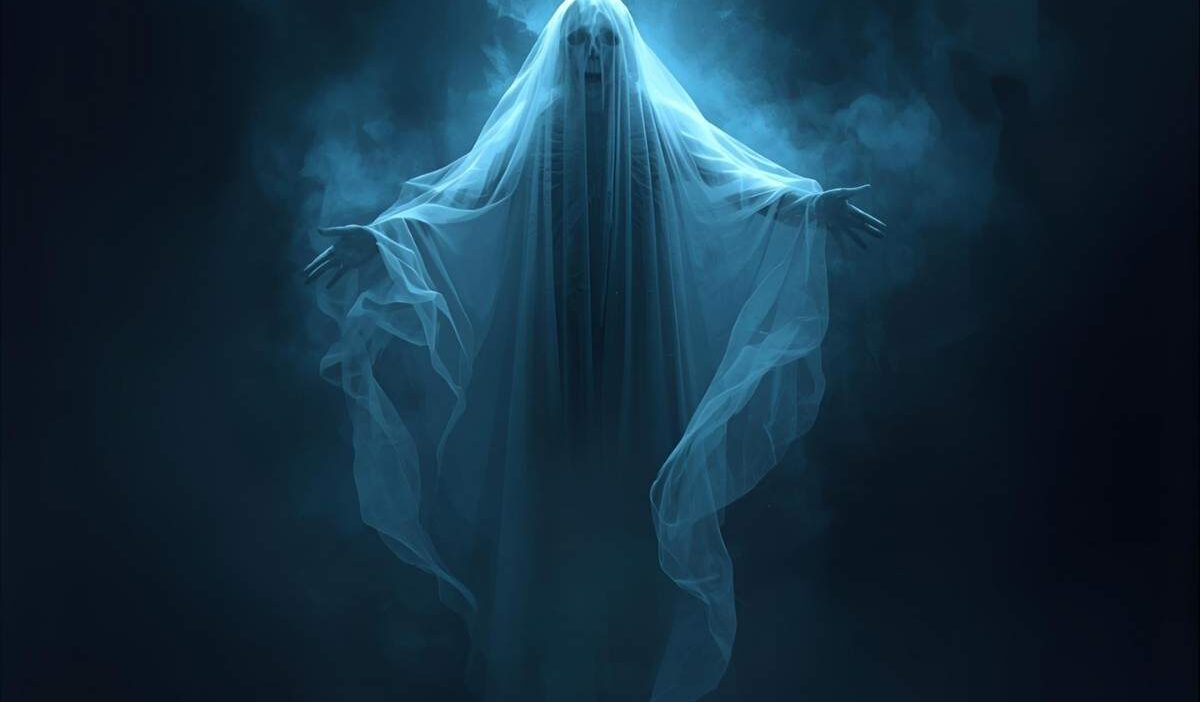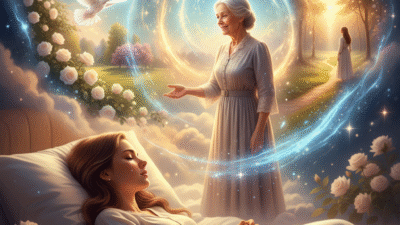Seeing ghosts in dreams often signals unresolved emotional issues, fears about mortality or the unknown, or parts of your inner psyche seeking recognition. In many interpretations, ghost dreams represent something from your past that hasn’t been fully processed and needs healing.
Dreams about ghosts fascinate us because they straddle the line between life and death, the seen and unseen. These dreams often feel vivid, haunting, and emotionally charged — stirring our curiosity about what messages lie beneath the surface. In this article, we’ll dig into the ghost dream meaning from psychological, spiritual, and cultural perspectives. You’ll learn the general symbolism, explore many common variations (e.g. being attacked by a ghost, becoming a ghost, ghost communication), examine a real-life illustrative example, dive into historical and cultural viewpoints, and get practical advice (including journaling and reflection). We’ll also answer common questions about ghost dreams so you can interpret your own more confidently.
General Meaning, Symbolism & Interpretations of Ghost Dreams
When someone dreams of ghosts, the imagery is rarely literal. Ghosts in dreams tend to symbolize what is hidden, suppressed, or unresolved in one’s psyche. Across psychological and spiritual traditions, ghost dream meaning generally falls into several overlapping categories:
- Unresolved emotions, guilt, regret, or past trauma
Ghost dreams often arise when something from one’s past continues to “haunt” the mind. This could be unresolved conflicts, shame, or relationships that ended without closure. Psychologists suggest that such dreams might reflect unfinished business in one’s life. LongDom+2Dream Interpretation | Dream Analysis+2 - Aspects of the self (shadow content, repressed parts)
In Jungian psychology, ghosts can serve as projections of the unconscious. They may represent parts of one’s shadow—qualities or memories that have been rejected or denied. Seeing a ghost might be the psyche’s call to integrate those hidden parts. dreampaths.com+1
Likewise, dream analysts often interpret ghostly images as symbolic messengers from the deeper mind urging the dreamer to reflect. - Fear of death, the unknown, or impermanence
Because ghosts are naturally tied to death and the boundary between life and afterlife, dreaming of ghosts may awaken existential anxieties—fears about loss, change, aging, or what lies beyond. Dream Interpretation | Dream Analysis+1 - Psychological processing & catharsis
Dreams are a kind of nightly emotional processing. Ghosts may appear as part of the mind’s effort to bring suppressed emotional material to awareness, so it can be addressed, healed, or released. LongDom+1
In this sense, ghost dreams can be opportunities for insight rather than mere portents. - Spiritual or spiritual-psychic messaging
In many spiritual traditions and folk beliefs, ghosts in dreams may be viewed as visits from spirits, ancestors, or spiritual guides. The dream may be interpreted as a bridge between worlds. Some see ghost dreams as intuitive nudges, spiritual warnings, or messages needing discernment.
Because ghost dreams are so rich with symbolism, the precise meaning depends heavily on context—your emotions in the dream, who or what the ghost is, how you interact, and the life circumstances you are facing.
Common Variations of Ghost Dreams
Here are several frequent types of ghost dreams, each with nuanced interpretations. I’ll provide the positive and negative angles, plus caveats.
Being Attacked or Chased by a Ghost
If you dream that a ghost is chasing, threatening, or attacking you:
- Negative angle: You may feel overwhelmed by anxiety, guilt, or fear that something from your past is catching up. It can signal that you’re avoiding confrontation with unresolved issues. dreams.co.uk+2ianwallacedreams.com+2
- Positive angle: The dream is pushing you to face what you’ve been neglecting. By confronting the “ghost,” you reclaim power over what has been holding you back.
Becoming or Transforming Into a Ghost
When you dream that you become a ghost or turn into one:
- This often indicates that the part of your identity or past you’ve suppressed is trying to emerge. You may feel disconnected from your own sense of purpose, or as though you’re invisible in your life. ianwallacedreams.com+2askmanisha.com+2
- Alternatively, it could mean you’re mourning a transformation—something died in you, and you’re adjusting to the new. The ghost self might be a threshold state calling for rebirth.
Ghost Communicates or Speaks
If the ghost in your dream speaks, whispers messages, or tries to convey something:
- Positive: This may indicate guidance—perhaps from your deeper self, intuition, or spiritual realm. The ghost’s message might be important for your waking life.
- Negative: It may also reflect deceptive self-talk or inner voices rooted in fear or regret. If the message is confusing or distressing, it may represent internal conflict more than external truth.
- In classical dream lore, hearing a speaking ghost has been taken as a warning or invitation—depending on tone and context. psychologistworld.com
Ghost Visiting You or in Your House
Seeing a ghost appear in your house or visiting you personally:
- Negative: This can mean you feel invaded by stress, guilt, or burdens you’ve carried secretly. The “house” in dreams often symbolizes the self, so a ghost visiting your home can signify something hidden entering your inner life. Auntyflo.com+2Dream Interpretation | Dream Analysis+2
- Positive: Sometimes it may suggest a reconnection—perhaps a message from ancestors, or a spiritual presence meant to comfort or prompt reflection.
Wedding Ghosts, Birthday Ghosts, Special Occasions
Dreaming of ghosts in special contexts (weddings, birthdays, funerals):
- Wedding ghost dreams: Could symbolize the merging of your past with your future, or that past relationships are influencing your current ones. They may point to unresolved emotional baggage entering your commitment phase.
- Birthday ghost dreams: Birthdays mark life cycles. A ghost on your birthday could underscore transition, mortality, or reminders of what you’ve lost or let go over time.
Ghosts of Loved Ones, Relatives, or Famous Figures
When the ghost is someone you know or a public/historical person:
- Loved ones: This often signals that unresolved grief or unfinished business exists with them. The dream may encourage you to speak your heart or forgive.
- Ancestors/spiritual figures: Some interpret this as ancestral guidance, blessings, or warnings from lineage.
- However, classical dream dictionaries caution that ghosts of parents or relatives might reflect danger or betrayal in waking life partnerships—so interpretation must always consider context. psychologistworld.com
Case Study / Illustrative Example
Let me share a composite example (based on common reports) to bring these meanings to life:
Case “Aisha”
Aisha is 32, working in a demanding job and recently ended a long friendship. Over several nights, she dreams that she is walking through her childhood home and suddenly a transparent figure of her best friend (who drifted away) appears. In the dream, the ghost friend seems lost, reaching out, but Aisha can’t hold her. She wakes with sadness and a feeling she left things unsaid.
In this scenario:
- The ghost figure likely represents unresolved emotions toward her friend and grief over the relationship’s end.
- The home setting means the emotional memory is deep, personal, rooted in identity and belonging.
- The inability to interact suggests fear of confrontation, avoidance of expressing feelings, or guilt about how things ended.
- The dream nudges her toward closure: perhaps a letter, conversation, or inner forgiveness.
For Aisha, reflecting and journaling allowed her to see that the ghost was a symbol of denial—she had been suppressing guilt. After writing a heartfelt note (even if not sent), she felt increased emotional peace and fewer ghostly dreams.
Cultural & Historical Symbolism of Ghost Dreams
Ghosts and spirits appear in myths, religions, folklore, and literature across cultures. Understanding that symbolism can deepen how we read ghost dreams in a broader human context.
- In many ancient civilizations, ghosts were thought to be restless souls tied to unfulfilled desires or duties. In classical Greek or Roman views, spirits lingered until proper funeral rites. Dreaming of ghosts could be read as contact with the underworld or warnings from the beyond.
- In Chinese culture, ancestral spirits and ghost visits have long been woven into dream lore. Ghost dreams were sometimes viewed as signs from ancestors or omens, shaping how people interpret them in context. National Geographic
- Medieval European folklore often linked ghostly visitations with sin, repentance, or divine punishment. Ghost dreams could be warnings from God or demonic test. Over time, literature (e.g. Shakespeare’s Hamlet) popularized the ghost as a messenger from the beyond.
- Ghost processions (“procession of the dead”) appear in many folk traditions—spirits marching across borders or between times—representing collective memory, death, and ancestral connections. Wikipedia
- In mythology and religion, ghosts may be tied to notions of judgment, karma, lingering karma, or spiritual debt. In some traditions, the ghost is caught between worlds until a ritual resolves its unrest.
- In modern psychological mythopoetic views, ghosts are symbolic rather than literal; they manifest universal archetypes (the “returning dead,” the unhealed wound) in dreams. Jungian and post-Jungian writers consider them part of soul-making. dreampaths.com+2olivedreaming.com+2
Thus, ghost dream symbolism is a tapestry of human belief, from ancestor worship to psychoanalytic archetypes. The cultural layer provides richness but must be integrated with personal experience.
Psychological Insights & Personal Growth Advice
Ghost dreams can feel unsettling, but they also offer a portal for self-discovery and healing. Here are strategies to work with them consciously:
- Dream journaling: As soon as you wake, jot down as many details as you can: visuals, feelings, interactions, and impressions. Over time patterns may reveal recurring ghosts or themes.
- Ask guiding questions: In waking reflection or journaling, ask:
- Who or what was the ghost?
- What did it want or need?
- How did I feel in the dream? Fearful? Sad? Curious?
- Where in my life is there unfinished business or guilt?
- What message might my deeper self want me to hear?
- Mindfulness and meditation: Before sleep, spend 5–10 minutes in quiet reflection. Invite your unconscious to speak gently rather than violently. Grounding practices (breathwork, body scan) help reduce anxiety.
- Inner dialogue / active imagination: You might imagine “inviting” the ghost into conscious dialogue: in meditation or guided visualization, ask what it wants, and listen. (This is inspired by Jung’s active imagination technique.)
- Seek closure or ritual: If your dream relates to a real relationship or event, actions toward closure may help: writing a letter (even unsent), a small ceremony to release emotions (burning paper, symbolic letting go), or verbal affirmation.
- Therapy or dream work: If ghost dreams recur or distress you deeply, a therapist trained in dream work or depth psychology can help you track patterns, integrate shadow elements, and heal trauma.
- Apply insights in daily life: Let the messages from ghost dreams guide small changes—apology, forgiveness, boundary setting, self-compassion. The transformation often happens gradually.
Over time, you may find that ghost dreams weaken, shift in tone, or transform into healing dreams rather than haunting ones.
Frequently Asked Questions (FAQ)
1. What does it mean if I frequently have ghost dreams?
Frequent ghost dreams may indicate persistent unresolved emotional issues, suppressed guilt, or recurring inner conflicts. They suggest your subconscious repeatedly calling your attention to something you’ve not yet processed. Dream work, journaling, or therapeutic help may assist in integrating those themes.
2. Are ghost dreams from the spirit world or psychological only?
Interpretations vary. Some spiritual traditions consider ghost dreams as actual visitations or ancestral communication. In psychological frameworks, ghost dreams are symbolic vehicles of the unconscious. Many people adopt a hybrid approach: symbolic messages interpreted with spiritual discernment.
3. Does dreaming of a ghost mean someone I know is going to die?
Not necessarily. Though ghost imagery involves death, in dream symbolism “ghost” rarely predicts literal death. It more often reflects transformation or closure of emotional chapters. Still, if you have strong personal context, you may consider whether the “ghost” refers to someone significant in life.
4. Can I control or prevent ghost dreams?
You can influence them by calming the mind before bed, maintaining a dream journal, reducing stress or trauma triggers, practicing relaxation techniques, and pre-sleep intention setting (e.g. “I invite healing, not fear”). Over time, increased awareness often diminishes distressing ghost imagery.
5. How do I distinguish a ghost dream from a nightmare?
While ghost dreams may be scary, nightmares tend to induce fear, danger, or panic rooted in actual threats. Ghost dreams often have a symbolic quality (transparent figures, ambiguous messages) rather than a consistent threat narrative. Notice if the “ghost” seems meaningful or metaphorical rather than simply terrifying.
6. What if the ghost in my dream is comforting or familiar?
A friendly or familiar ghost may signify a benign guide or part of your psyche offering insight, protection, or reassurance. It may represent someone you loved or an inner intelligence you can trust. Explore what the figure means to you personally.
Conclusion
Dreams of ghosts carry potent symbolism. In short: ghost dream meaning often points to unresolved emotions, suppressed aspects of the self, and the pull of memory or mortality. But ghost dreams are not just harbingers of fear—they can be doorways to healing, guidance, and transformation.
Would you like me to adapt this into a blog post (with internal links or images), or curate a shorter version?

Olivia Bennett is a lifestyle researcher and holistic wellness advocate specializing in mindfulness, dream healing, and manifestation techniques. With a background in psychology and meditation therapy, Olivia writes to empower readers to achieve mental clarity and emotional balance through dream awareness. Her articles provide practical tips, spiritual insights, and real-life strategies for boosting intuition and creating a more meaningful life. Olivia’s work at DreamingSign.com inspires readers to use dreams as a tool for personal transformation.




